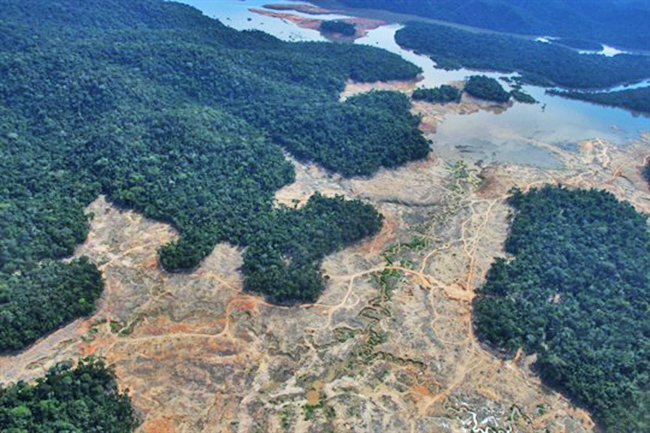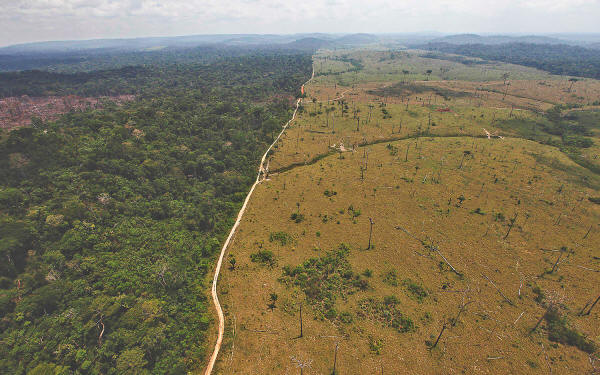|
November 06, 2018 from WorldPoliticsReview Website
Deforested areas near the Juruena National Park in Brazil, March 23, 2017 (DPA photo by Isaac Risco-Rodriguez via AP Images).
But that progress in
protecting a fragile and essential ecosystem reversed in recent
years, before the outlook got
even worse.
Then, last month Brazilians elected the far-right Jair Bolsonaro as president, a major supporter of agribusiness who has vowed to put economic growth over environmental protection.
That combination could
mean a surge in deforestation in the Amazon with serious
implications not just for the Brazilians most directly affected, but
for the wider world.
Its trees release carbon dioxide when cut down or burned, and sequester it when planted or left in place. The pace of deforestation, especially in tropical areas like Brazil, has become a major contributor to climate change, as large in the aggregate as the European Union's greenhouse gas emissions.
Reversing those trends could reduce global emissions by even more - as much as 30 percent according to some estimates.
Rainforests like the Amazon's are also important for global biodiversity and local resilience. In addition to the ecological benefits it provides, biodiversity creates economic opportunities through eco-tourism and sources of new pharmaceutical products.
Forests also contribute to localized amenities, such as clean water and protection from climate-related disasters that include flooding and mudslides, as well as drought.
Reducing tropical
deforestation could stem the temperature rise due to greenhouse gas
emissions
faster and more cost-effectively
than other options, according to researchers at the Center for
Global Development.
It was the result of a multifaceted policy that included private sector and public policy changes to reduce demand for deforested land, as well as stronger law enforcement to raise the risk of illegal forest clearing.
Brazilian policymakers focused on forest areas that were most at risk from current economic activities.
They created new national parks and "extractive reserves," where rubber tapping - extracting latex from rubber trees - or other sustainable economic activities were permitted, but clear-cutting forest was not.
A study, involving a large group of scientists, found that more than half of the Amazonian tree species could become extinct, thanks to massive deforestation. More than 5,000 trees species are in deep trouble, including the ones that are producing cacao and açaí palm. AP photo
They also empowered
indigenous peoples for whom the rainforests are a way of life, and
slowed the building of roads in more remote areas.
is the latest stark reminder that elections, and trade wars, often have
unintended or
unexpected consequences...
Though small, a conservation program known as Bolsa Floresta has paid people in sensitive rural areas to preserve the forest and the ecosystem services that it provides, such as cleaner water downstream.
On the private sector side, protests against big agribusiness, primarily based in the United States and Europe and importing soybeans from Brazil, led those companies to adopt policies discouraging deforestation in their supply chains.
In 2006, major
international traders and buyers agreed with the major trade
associations representing Brazilian growers that soybeans would no
longer come from newly deforested areas. Since then, the share of
new cropland that has been developed for soy production at the
expense of forests dropped from 30 percent to less than 1 percent.
He has proposed loosening the enforcement of environmental regulations, as well as combining the ministries for agriculture and the environment, so that farming takes priority over conservation.
Bolsonaro also threatened to follow Trump in withdrawing from the Paris climate change agreement, though he subsequently walked that back.
Bolsonaro
Even if Bolsonaro pursues
no formal legal changes, the downgrading of rainforest protection as
a governmental priority is likely to mean fewer resources and less
rigorous enforcement of existing environmental laws, which could
lead to higher rates of deforestation again...
American farmers grow and export a lot of soybeans, and over the past few years more than half of the exports have gone to China. China has more pigs than the United States has people, and soy protein is a major feedstock for the pork industry.
Between them, U.S. and Brazilian farmers supplied 80 percent of the oilseeds imported by China in 2016 and 2017.
With just the threat of
tariffs in the air, the Brazilian share of the Chinese oilseeds
market jumped to nearly half in 2017, while the American share
dropped to a third, according to the United Nations'
trade database.
With American exports now subject to a 25 percent tariff, China is increasingly looking to Brazil and other South American countries to replace them. The initial response was a spike in prices for Brazilian soybeans, which increases the incentives to convert more Amazon forest to farmland by clear-cutting.
Since Chinese buyers are
generally less sensitive to consumer and activist pressures, this
shift in demand could undermine the private sector efforts in Brazil
to reduce deforestation pressures related to soy production.
It is the latest stark
reminder that elections, and trade wars, often have
unintended or unexpected consequences...
|




